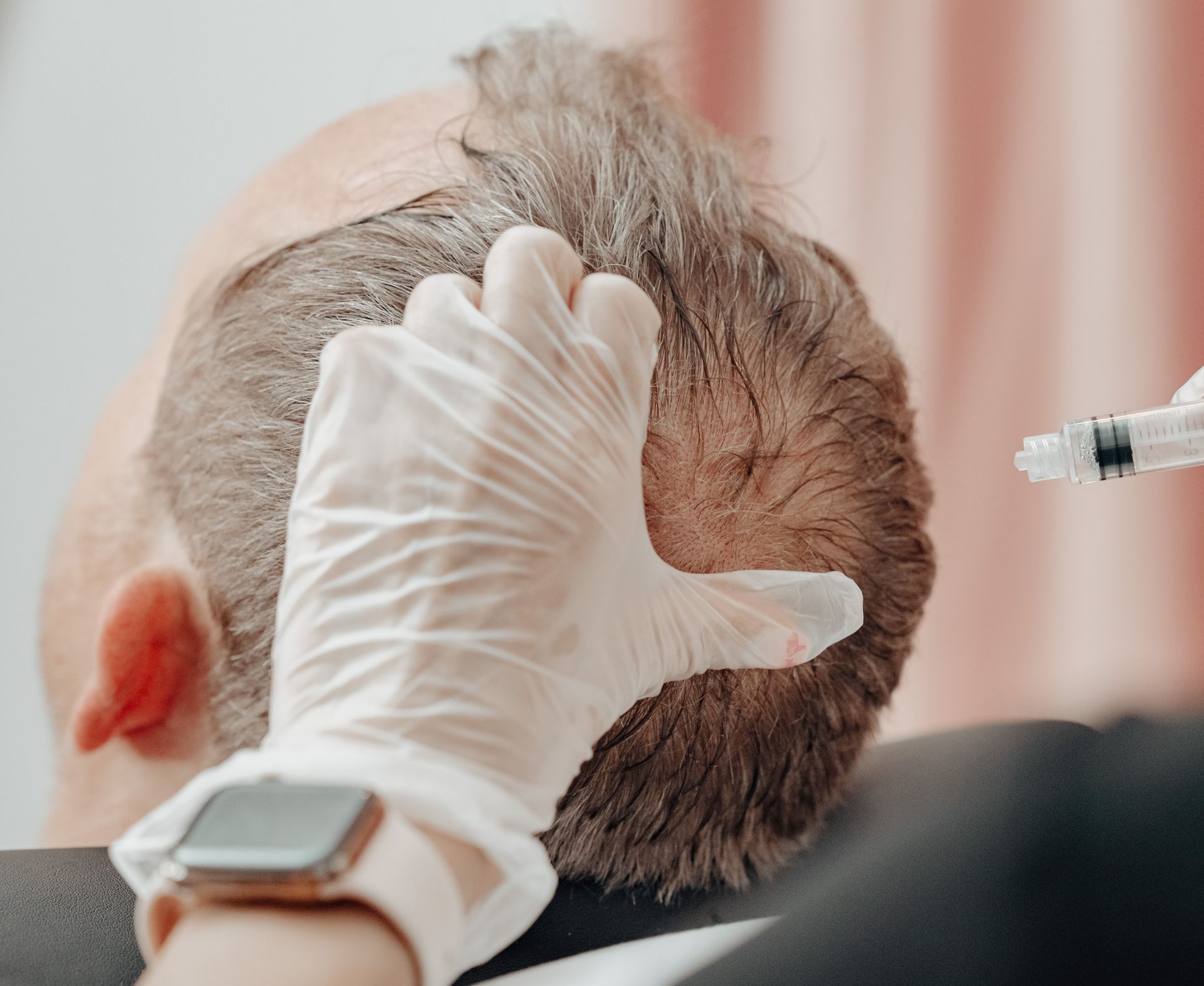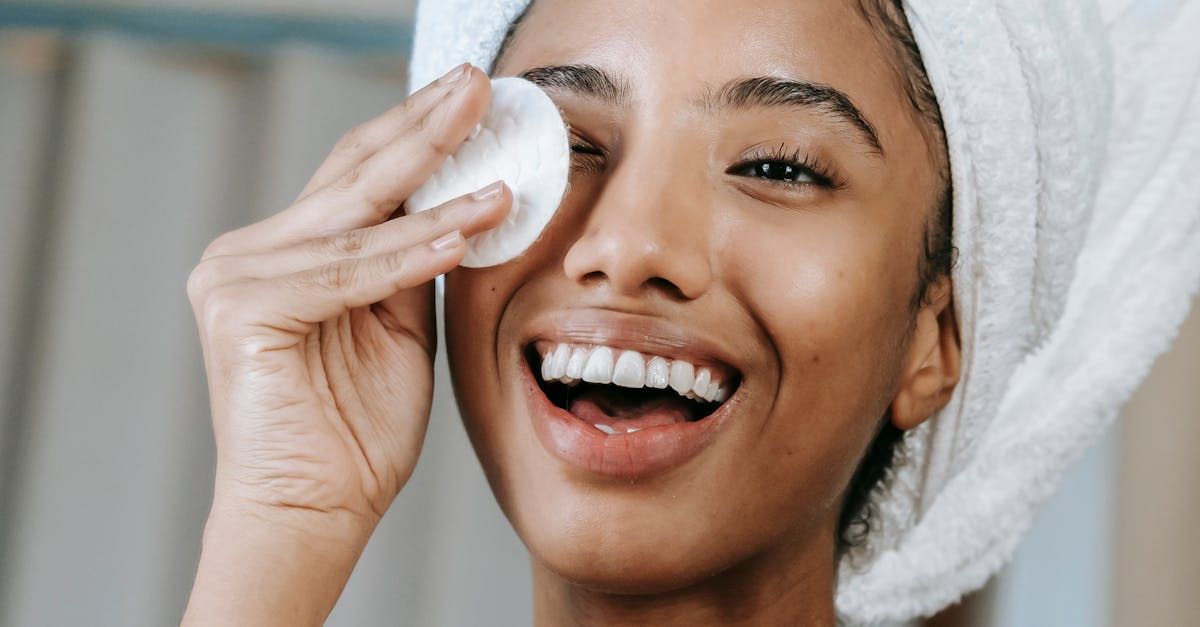Types of Stress-Related Hair Loss
Stress-related hair loss unveils a spectrum of challenges that many individuals face. Here are types of stress-induced hair loss to understand it:
Telogen Effluvium
One prevalent form of stress-related hair loss is Telogen Effluvium. Imagine your hair taking a break, that happens during this condition. Stressors push many hair follicles into a resting phase, leading to significant hair shedding.
It's important to note that the shedding typically occurs a few months after the stressful event. Symptoms include increased hair on your pillow or in the shower. Fortunately, this type of hair loss is often reversible.
Alopecia Areata
Alopecia areata is another stress-related hair loss type that manifests as small, round patches of hair loss. The immune system mistakenly attacks hair follicles, causing hair loss. Some get a few spots, while others lose all their hair.
Fortunately, hair can return, but the situation is unpredictable, so professional advice is essential.
Trichotillomania
Some people get trichotillomania from stress. This involves a strong desire to remove hair from the scalp, eyebrows, or other areas. Unfortunately, this coping method causes visible hair loss.
Trichotillomaniacs may feel relieved after taking off their hair, but the repercussions are clear. Therapy and help are needed to break this behavior.

How To Regain Hair From Stress
Practical ways to prevent stress-related hair loss and encourage hair growth are listed below.
Tropical Treatments
Natural treatments that help soothe your scalp and hair, promoting a revitalizing recovery. Explore these tropical wonders that can help make a difference
Aloe Vera
Coconut Oil Massage
Avocado Hair Mask
Banana
Papaya
Hibiscus
Prescribed Medications.
Finasteride
Minoxidil
Corticosteroids
Biotin
Anti-Anxiety Medications
Lifestyle Changes
Simple lifestyle changes can reduce stress-related hair loss. Prioritize regular exercise to relieve stress and boost scalp blood circulation. A balanced diet with vitamins and minerals can help hair health.
Stress Management Techniques
Stress management is essential to treating stress-related hair loss. Practice awareness like meditation or deep breathing daily. These techniques can help alleviate stress and promote a healthier mind, positively impacting hair growth.
Nourishing Hair Care Routine
Adopting a nourishing hair care routine is essential to promoting overall hair health. Choose shampoos and conditioners that are gentle on the scalp and free from harsh chemicals. Regularly moisturize your scalp to prevent dryness, a common contributor to hair loss. A healthy and clean scalp provides an optimal environment for hair growth.
Frequently Asked Questions For Female Hair Loss
Diagnosis and Evaluation
Knowing the symptoms of female pattern baldness is the first step to restoring confidence and beautiful hair. This section covers the basics of identifying and assessing female pattern baldness.
- Medical History Discussion: During your appointment, your healthcare provider will ask about your medical history. Share any relevant details such as family hair loss history or medications.
- Physical Examination: Your healthcare provider will physically examine your scalp and hair. They will closely inspect your hair follicles, looking for signs of thinning or miniaturization.
- Pull Test: One standard diagnostic test is the "pull test." The doctor gently tugs your hair in this test to see how easily it comes out. Excessive hair loss during this test may indicate female pattern baldness.
- Scalp Biopsy: In some cases, a scalp biopsy may be recommended. This involves taking a small sample of your scalp tissue for a closer examination under a microscope. It helps confirm the diagnosis and rule out other conditions.
- Blood Tests: Blood testing may be done to diagnose thyroid issues or hormonal imbalances that may cause hair loss.
- Phototrichogram: This measures hair density and growth patterns using specialized equipment. It reveals hair loss severity.
Treatment Options
Addressing female pattern baldness requires a proactive approach to restore healthy hair growth. Here are effective hair restoration treatment options tailored to women experiencing this common issue:
Lifestyle and Dietary Changes
Lifestyle and dietary changes can help female pattern baldness. These changes can nourish and grow your hair, addressing this frequent issue holistically.
- Balanced Diet: To combat female pattern baldness, start by nourishing your body with a balanced diet rich in essential nutrients. Include lean proteins, fruits, vegetables, and whole grains. These provide vitamins and minerals that promote hair health and growth.
- Nutritional Supplements: Supplements can complement your diet and provide the extra nutrients your hair needs. Biotin, iron, zinc, and vitamins A, C, and D are available as supplements. These can strengthen and prevent hair loss.
- Hydration: Proper hydration is crucial for healthy hair. Drink adequate water daily to keep your scalp and hair follicles hydrated. Hydration supports overall hair health and can help prevent hair loss.
- Exercise: Regular exercise boosts your overall health and improves blood circulation, including to your scalp. This enhanced blood flow can help nourish hair follicles, promoting healthy growth.
Topical Treatments
There are hair loss treatment designed to promote hair growth and boost confidence in women facing this common issue. Explore some potential topical treatments for fuller, healthier hair.
Procedures and Therapies
Addressing female pattern baldness requires a proactive approach to restore confidence and promote hair regrowth. Here are some effective hair regrowth for women that can help combat this common concern among women.
- Keralase: an innovative hair loss solution that harnesses the cutting-edge LaseMD Ultra Laser technology in conjunction with the potent Kerafactor serum. This revolutionary approach is specifically crafted to revitalize hair growth in both men and women experiencing adult pattern thinning and hair loss stemming from hormonal imbalances, environmental stressors, or physiological factors.
- Platelet-rich plasma (PRP) Therapy: This therapy is gaining popularity among women with pattern baldness. A small amount of blood is processed to concentrate the platelets, and the platelet-rich plasma is injected into your scalp. This stimulates hair follicles and encourages new hair growth.
- Scalp Micropigmentation (SMP): A non-surgical procedure where pigments are tattooed onto the scalp to create the appearance of a fuller head of hair. For quick and effective thinning hair concealment, it's ideal.
Coping Mechanisms and Prevention Strategies
In the fast-paced rhythm of modern life, stress has become an inevitable companion for many. Yet, there are effective ways to navigate and manage stress through behavioral interventions. These interventions to change thought and behavior give people practical tools to handle life's obstacles.
Mindful activities, relaxation, and good behaviors can help people manage stress and build resilience. The significance of maintaining a healthy lifestyle cannot be overstated in fostering overall well-being. A wholesome lifestyle encompasses not only physical health but also mental and emotional wellness.
Regular exercise, a balanced diet, and enough sleep boost mood and energy while strengthening the body's stress resistance. Prioritizing self-care is akin to investing in vitality creating a solid foundation for a fulfilling and joyful life.
Frequently Asked Questions
Will Hair Loss From Stress Grow Back?
Yes, hair loss from stress is temporary in many cases, and hair can regrow once the stress is reduced or managed.
Can Lack Of Sleep Cause Hair Loss?
Yes, chronic lack of sleep can contribute to hair loss by disrupting normal hair growth cycles.
How Do I Stop My Hair Falling Out From Stress?
Managing stress through meditation, exercise, and a healthy lifestyle can help prevent and reduce stress related hair loss.
How Long Can Temporary Hair Loss Last?
Temporary hair loss can last a few weeks to several months, depending on the underlying cause. Once the cause is addressed, hair often starts to regrow.
Which Hair Loss Is Permanent?
Androgenetic alopecia, also known as male-pattern baldness or female-pattern baldness, is a common cause of permanent hair loss. It is usually hereditary and tends to progress over time.
What Causes Hair To Fall Out?
Genetics, hormonal changes, medical disorders, drugs, and environmental factors can cause hair loss. The most common cause is a hereditary condition called androgenetic alopecia. Other factors like stress, poor nutrition, and certain hairstyles or treatments, can contribute to hair loss as well.


